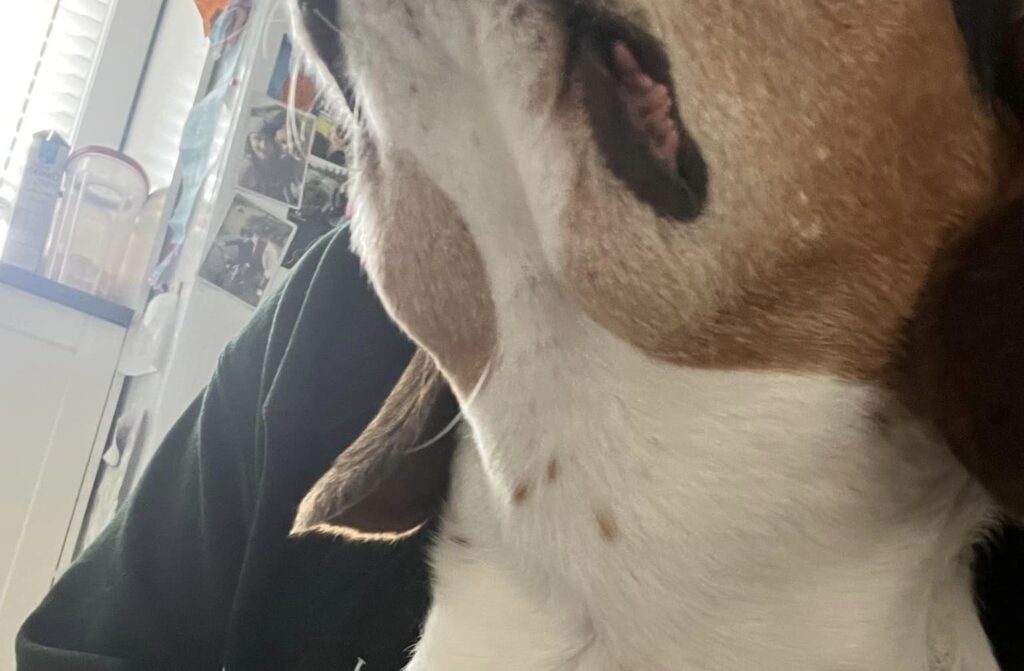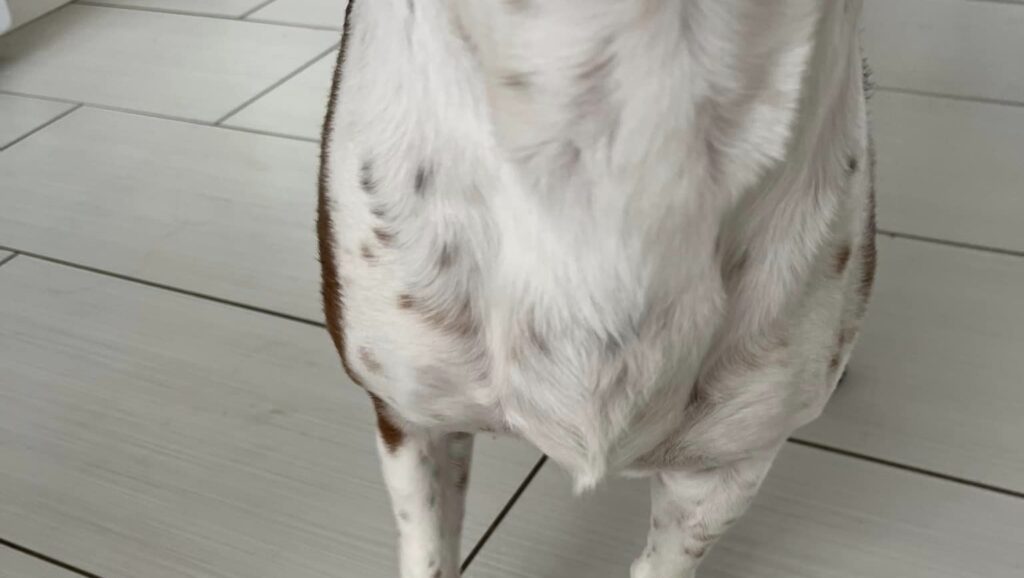It is important to understand the timeframe in which your pet may experience this issue and when recovery may occur.
We will cover topics such as what causes enlarged lymph nodes, treatments that can help, and signs of improvement over time.
With this information, you can better prepare yourself and your pet for what to expect during this time.
- Key Takeaway
- What is Lymph Node Inflammation (Lymphadenopathy)?
- How Long Does It Take For a Dog’s Lymph Nodes To Go Down?
- How To Help a Dog With Swollen Lymph Nodes
- How Long Does It Take Dogs To Recover From Swollen Lymph Nodes?
- FAQs
- Q: What are the symptoms of swollen lymph nodes in dogs?
- Q: What are the treatment options for swollen lymph nodes in dogs?
- Q: What are the common causes of swollen lymph nodes in dogs?
- Q: Where are the lymph nodes located in dogs?
- Q: What is lymphoma in dogs?
- Q: What is the prognosis for dogs with lymphoma?
- Q: How can I diagnose swollen lymph nodes in my dog?
- Q: Can swollen lymph nodes in dogs be a sign of lymphoma?
- In Conclusion
Key Takeaway
- Lymph Node Inflammation (Lymphadenopathy) in dogs is the enlargement of one or more lymph nodes, often due to underlying conditions such as infections, allergies, or diseases like cancer.
- The time for a dog’s lymph nodes to decrease in size can range from a few days to weeks, depending on the cause of the swelling and the effectiveness of the treatment.
- To help a dog with swollen lymph nodes, consult a vet for a proper diagnosis and follow the prescribed treatment plan, which may include medications, dietary changes, or in severe cases, surgery.
What is Lymph Node Inflammation (Lymphadenopathy) In Dogs?

Lymph Node Inflammation or Lymphadenopathy in dogs is a condition where one or multiple lymph nodes become abnormally enlarged, often due to an underlying disease or infection.
This enlargement can be caused by various factors including bacterial, viral, and fungal infections, allergies, and even neoplasia or immune-mediated diseases.
Symptoms of this condition in dogs can include nausea, lack of appetite, vomiting, and difficulty swallowing, eating, or breathing.
Treatments for swollen lymph nodes in dogs can range from antibiotics, antifungals, anti-inflammatories, and steroids to surgery in some cases.
It’s important to note that even though lymphadenopathy is a common clinical concern in dogs, the causes can range from benign to serious.
See also: How To Find Dog Lymph Nodes [Complete Guide]
How Long Does It Take For a Dog’s Lymph Nodes To Go Down?

The time it takes for a dog’s lymph nodes to go down can vary from a few days to weeks, depending on the underlying cause and treatment.
The time it takes for a dog’s lymph nodes to return to their normal size can vary greatly, depending largely on the underlying cause of the enlargement.
If the swelling is due to an infection, and the dog is treated with appropriate antibiotics or antiparasitic or antifungal medication, the lymph nodes may start to reduce in size within a few days to weeks after the infection has been cleared.
However, if the lymph node enlargement is due to a more serious condition such as cancer, the treatment period could be longer and the lymph nodes may not return to their normal size without specific treatment such as chemotherapy.
See also: Can Dogs Live Without Lymph Nodes?
How To Help a Dog With Swollen Lymph Nodes
Here is how to help a dog with swollen lymph nodes:
Recognize Signs of Swollen Lymph Nodes in Dogs
Swollen lymph nodes in dogs can be a sign of various health issues, ranging from infections to cancer. It’s essential to monitor your dog’s behavior and physical condition closely, checking for any unusual lumps or bumps that could indicate swollen lymph nodes.
Seek Veterinary Help
If you notice any signs of swollen lymph nodes in your dog, it’s crucial to consult with a vet as soon as possible. The vet can perform necessary tests to determine the cause of the swelling and recommend an appropriate treatment plan.
Treat Underlying Causes
The treatment for swollen lymph nodes in a dog usually involves addressing the underlying cause. If the swelling is due to a bacterial infection, the vet may prescribe antibiotics. Antifungal or anti-inflammatory medication may also be used if necessary.
Offer Proper Care at Home
At home, you can help your dog recover by ensuring they get plenty of rest, eat a balanced diet, and stay hydrated. Regular exercise can also help improve your dog’s lymph circulation.
Consider Other Treatment Options
In some cases, the vet may recommend other treatments such as surgery, chemotherapy, or radiotherapy, particularly if the swollen lymph nodes are due to a more serious condition like cancer. Acupuncture and acupressure are also options that some pet owners consider to boost their dog’s overall health.
See also: How Do Dogs Get Lymph Node Cancer
FAQs
Q: What are the symptoms of swollen lymph nodes in dogs?
A: Swollen lymph nodes in dogs may manifest as lumps or bumps under the skin. Other symptoms can include fever, decreased appetite, weight loss, fatigue, and changes in behavior.
Q: What are the treatment options for swollen lymph nodes in dogs?
A: The treatment options for swollen lymph nodes in dogs depend on the underlying cause. They may include antibiotics, anti-inflammatory medications, surgery, chemotherapy, or radiation therapy.
Q: What are the common causes of swollen lymph nodes in dogs?
A: Swollen lymph nodes in dogs can be caused by various factors such as infections (bacterial, viral, or fungal), inflammation, immune system disorders, cancer (including lymphoma), or an abnormal response to certain medications or vaccinations.
Q: Where are the lymph nodes located in dogs?
A: Dogs have lymph nodes located throughout their body, including in the neck (submandibular lymph nodes), under the jaw, in the armpits, groin area, and behind the knees.
Q: What is lymphoma in dogs?
A: Lymphoma is a type of cancer that affects the lymphatic system, which includes the lymph nodes, lymphatic vessels, and lymph fluid. It is one of the most common cancers diagnosed in dogs.
Q: What is the prognosis for dogs with lymphoma?
A: The prognosis for dogs with lymphoma can vary depending on various factors such as the stage of the disease, the dog’s overall health, and the chosen treatment approach. With timely and appropriate treatment, some dogs with lymphoma can experience remission and enjoy a good quality of life for an extended period.
Q: How can I diagnose swollen lymph nodes in my dog?
A: The diagnosis of swollen lymph nodes in dogs typically involves a physical examination by a veterinarian, who will palpate your dog’s lymph nodes to assess their size, shape, and consistency. Further diagnostic tests such as blood work, imaging (X-rays, ultrasound), or biopsy may also be recommended to determine the underlying cause.
Q: Can swollen lymph nodes in dogs be a sign of lymphoma?
A: Yes, swollen lymph nodes in dogs can be one of the symptoms of lymphoma. However, it is essential to note that not all cases of swollen lymph nodes necessarily indicate lymphoma. Proper diagnostic evaluation is necessary to determine the cause.
In Conclusion
In conclusion, it is important to stay diligent in monitoring your dog’s lymph nodes.
There is no definitive answer as to how long it takes for the lymph nodes to go down, as there are a variety of factors that affect this.
However, if you take your dog in for regular checkups exercise regularly, and feed them a healthy, balanced diet, you can help ensure their lymph nodes remain normal.





Leave a Reply